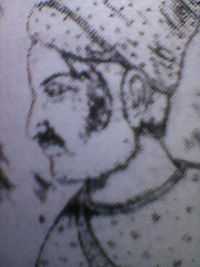Raskhan
 | |
| Name | Raskhan |
|---|---|
| Born | 1548 A.D. |
| Birth Place | Amroha, India |
| Died | 1628 A.D. |
| Death Place | Vrindavan |
| Religion | Hindu, Muslim |
| Poetry Collection | Raskhan Rachnavali |
Raskhan (born 1548 A.D.) was a poet who was both a Muslim and follower of Lord Krishna. His real name was Sayyad Ibrahim and is known to have lived in Amroha in India. Raskhan was his pen name which means Mine of Rasa. In his early years, he became a follower of Lord Krishna and learned the religion from Goswami Vitthalnath and began living in Vrindavan and spent his whole life there. He died in 1628 A.D. His samadhi is at Mahaban which is situated about six miles east of Mathura.
History
There are differences in the opinion of scholars regarding his year of birth. Estimates include 1614 and 1630, while Mishra Bandhu believes that Raskhan was born in 1558 and died in 1628. Most of the scholars say Raskhan was a Pathan Sardar and his birthplace was kabul in the afganistan district. Hajari Prasad Dwivedi claims Raskhan was born Saiyad Ibrahim in his book, and that Khan was his title. Raskhan was the son of a Jagirdar (rich landowner)and lived in the lap of luxury throughout his youth. His family was wealthy, and he received a good education. Raskhan spoke both Hindi & Persian; he translated "Bhagavata Purana" into Persian. His shrine is located in Gokul near the Yamuna river, Bhramand Ghat. It is a very peaceful place. Many Krishna devotees come there to pay their respects & meditate.
Subject matter
The poetry of Raskhan focuses on Lord Krishna. "Lilas" of Lord Krishna, such as Bal Lila, Chir Haran Lila, Kunj Lila, Ras Lila, Panghat Lila, and Dan Lila, were his favorite subjects. Apart from Lilas, Raskhan has also created poems on Lord Shankar, Goddess Ganga, and the Holi festival.
Poetry
Raskhan is widely acknowledged as a great poet, having dedicated most of his creations to Lord Krishna. Sujan Raskhan and Prem Vatica are some of his available creations. Raskhan Rachnavali is the collection of Raskhan's poetry. His creations describe the beauty of not only Lord Krishna but also his relations with his beloved Radha. His poetry is in the form of Doha, Padawali and Savayya.